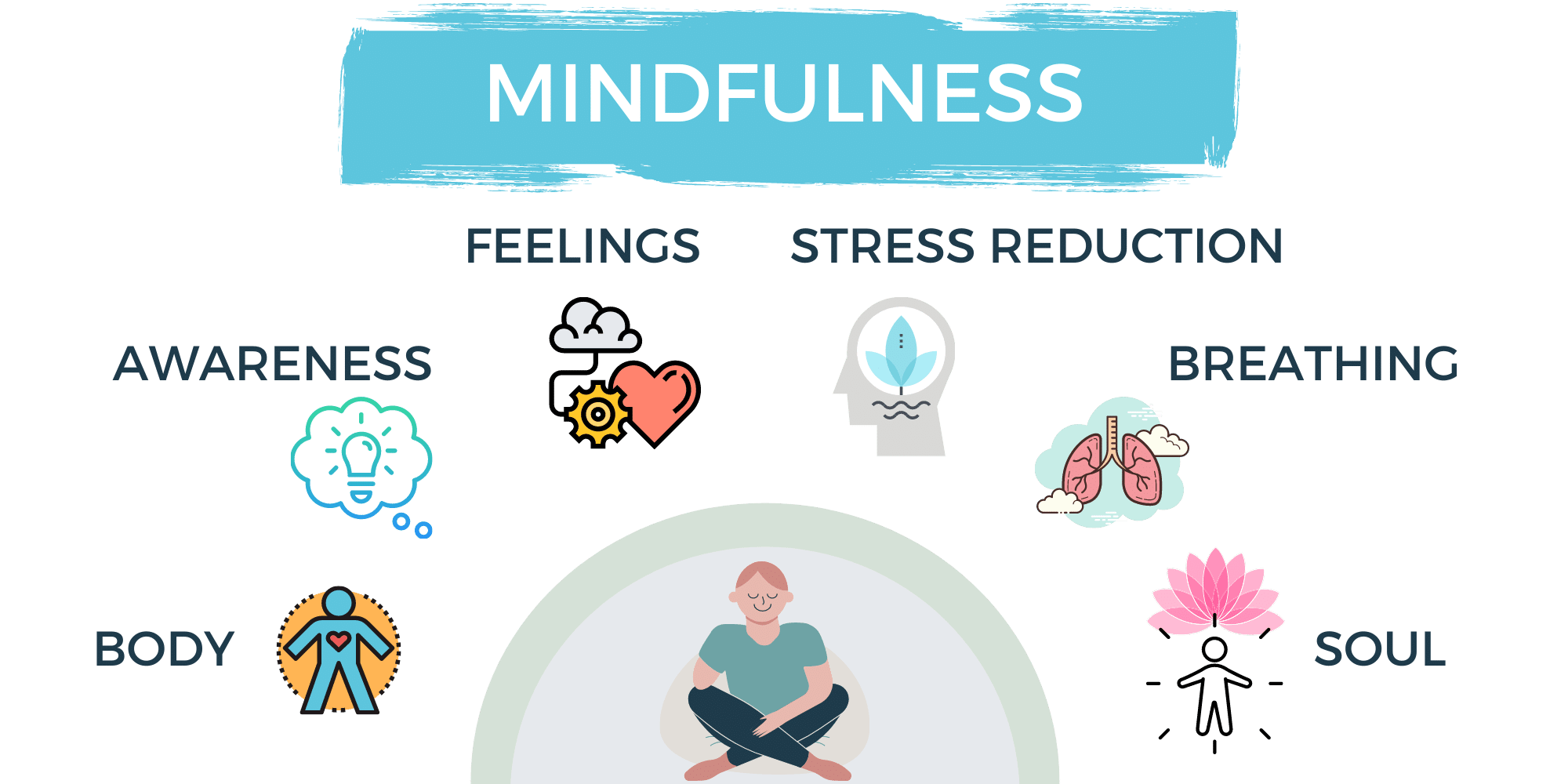Mindfulness Therapy
Discover calm and clarity through mindfulness

In a world full of distractions, it's easy to lose focus on what's going on in the moment. We've all had the experience of driving somewhere while we're absorbed in intense thoughts, only to reach the destination with no memory of the trip.
While it's normal to be preoccupied occasionally, when people are under high amounts of stress, this process can add to their suffering.
Emotional struggles often make people feel overwhelmed and unable to focus on anything else. If you've ever been upset and embarrassed by your reaction, you know how hard it can be to regain your equilibrium.
This is especially true for people who suffer from anxiety or depression.
But you don't have to be at the mercy of stress and painful feelings. Mindfulness can help you take back control of your focus, even when emotions are running high.

What is Mindfulness?
Although the practice has roots in Hindu and Buddhist teachings, modern psychology has developed ways to implement some of the key techniques to bring people relief. The religious roots of mindfulness can make people feel dubious about how effective it is, but there's compelling scientific research that shows that it works.
Mindfulness helps you develop a rational, accepting perspective on who you are and what you're going through. This understanding can reduce stress, helping you stop the self-feeding cycle of anxiety and negative thoughts. It's based on two important concepts: awareness and acceptance.

Awareness refers to the skill of turning your attention to the moment, observing the emotions, sensations, thoughts, and environment you're experiencing. Then you can practice acceptance of these things without being judgmental. Instead of judging yourself about what you notice, it encourages an attitude of openness and curiosity.
It may seem like a simple thing to be aware of what's happening and to accept it, but it's not always so simple. Many people struggle with anxiety about their thoughts, and they can get stuck in negative behaviours as a way to avoid feeling difficult emotions. Simply acknowledging what you're experiencing can diffuse its power to affect your feelings and behaviours.
Can Mindfulness Help You?
At its most simple form, mindfulness can help anyone bring more peace into their day. Imagine being able to calmly pay attention to what you're thinking and doing during the frantic morning dash to get to work. You'd be much less likely to get upset or drive away with your coffee cup on top of your car.
But for people who struggle with issues such as anxiety and depression, mindfulness can do so much more. It's an important tool to help them improve their mental health.
Mindfulness-based interventions have undergone extensive research in the past decade. And the results are impressive.
Not only have these techniques been shown to be effective in treating anxiety and depression, but they've also had better results than other approaches, such as relaxation training and health counselling.
Mindfulness therapy has been used to help patients with a wide variety of issues. Some of the conditions that respond well to this approach include:
- Anxiety
- Depression
- Depression Relapse
- Chronic Pain
- Bipolar Disorder
- Low Mood
- Eating Disorders
- PTSD
Lets us Help you Find the Right Match
Right Therapist, Right Plan, Real Support
Evidence‑based therapy plus the right counselling match helps you move from coping to thriving—on a schedule that sticks.
Can Mindfulness Help You?
Although it can be described as simply paying attention to your thoughts and feelings, learning mindfulness requires focused practice. It's helpful to have an experienced therapist walk you through a variety of exercises to help you develop your skills. Once you're able to use them in your daily life, they become a powerful tool for you to support your mental health.
There are a number of different techniques that practitioners use to build mindfulness, and they can be as simple as a three-minute exercise or as involved as a walking meditation. It will take some experimentation to find what works for you and to gain a sense of confidence in using it.
One important skill is becoming aware of how your body feels in the present moment. Yoga is an example of a discipline that has this work built into it. There are also individual practice exercises to help you develop this awareness, such as a body scan. This involves having you lie down and quietly focus on your body in a methodical way, observing the physical sensations you're feeling.
Becoming aware of what you're thinking in difficult moments without the added stress of judging those thoughts can be an important part of this process.

There are different forms of meditation that can be useful too. Traditional meditation is an obvious choice, but you can also opt for guided sessions or active approaches, such as walking meditation. You can even stretch meditatively, enabling you to pay attention to your body and care for it at the same time. It can be hard to start meditating if you're not used to it, and many people find it useful to have someone walk them through it at first.
One simple but effective tool is known as the three-minute breathing space technique. As the name suggests, this only takes three minutes, spending one minute focused on each of the steps. First, you observe the emotions and thoughts you're experiencing right now, without judging them. Next, spend a minute focusing only on your breath. Finally, notice the sensations you're feeling in your body.
Overall, this practice is a natural fit with Cognitive Behavioural Therapy (CBT). CBT teaches that our thoughts impact our feelings, and choosing different thoughts can help patients to break free of emotions that seem overwhelming. Becoming aware of what you're thinking in difficult moments without the added stress of judging those thoughts can be an important part of this process.
Mindfulness has been shown to help people deal with issues ranging from everyday stress to serious depression and anxiety. At Trillium Counselling, our therapists are experienced in using a range of mindfulness techniques to help you to achieve your mental health goals.
FAQs
Therapy works best when the 'fit' is right with your therapist. That’s why we carefully match you with someone whose expertise fits your needs and preferences. Building a strong therapeutic relationship is key to creating a supportive and effective experience.
Before meeting your therapist, you’ll complete a brief intake form. Your first 50‑minute session focuses on what brings you in, your goals, relevant history, and what success would look like. We’ll explain confidentiality and co‑create a plan so you know what comes next. It’s normal to feel nervous—your therapist will guide the pace.
The frequency of sessions depends on your needs and goals. Many people start with weekly or bi-weekly appointments and adjust as they make progress. The total number of sessions is unique to you—your therapist will work with you to find the right approach.
In your first mindfulness therapy session, you’ll be gently introduced to simple mindfulness practices, such as focusing on your breath or paying attention to the present moment.
Your therapist will guide you through these exercises at a pace that feels comfortable, explain how mindfulness works, and help you explore how it may support your goals—whether that’s managing stress, easing anxiety, or finding more balance in daily life.
By the end of the session, you’ll have a clearer sense of what mindfulness therapy looks like and how it can fit into your journey toward well-being.
Most of our services are covered by extended health benefit plans. Coverage varies with every plan, so please check your specific plan or contact your provider to confirm your benefits.
Most employer benefits cover therapy with a Registered Social Worker (MSW, RSW) or a Registered Psychotherapist (RP). We can direct bill to most major insurers when your plan allows it; otherwise, we email insurance‑ready receipts after your session.

Last Reviewed Aug 5 2025 by Milena Urbanajc
Milena has over 10 years of experience working in support of individuals with significant mental health challenges and their families to be able to cope and move forward to a path of recovery. In addition to the Masters in Social Work, Milena also holds Additional Bachelor Degrees in Social Work and Social Development Studies and a Certificate in Child Abuse Studies from U of W, and play therapy training from Canadian Association for Play Therapy.
Not sure yet? Let’s talk it through.
If you’d like to ask questions or explore your options first, book a free 20-minute matching consult or give us a call (226-752-8857) . One of our team members will help you find the right therapist and next steps that feel comfortable for you.
%20(1).png?width=200&height=80&name=Trillium%20Counselling%20Logo%20(999%20x%20398%20px)%20(1).png)

















